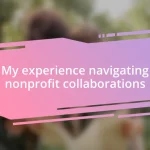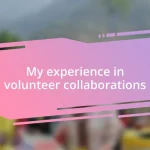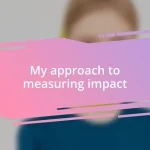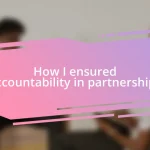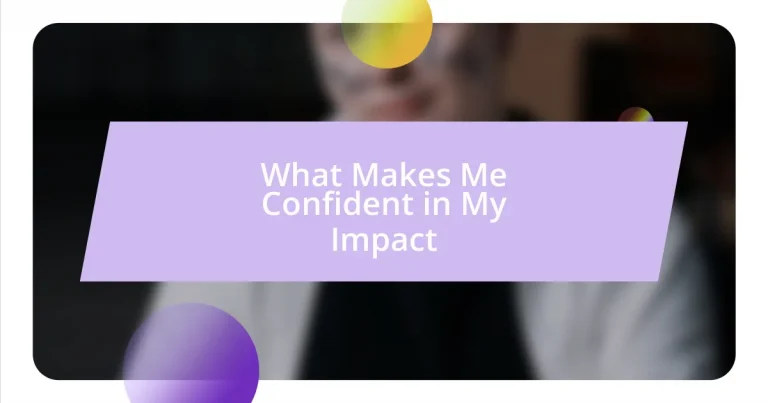Key takeaways:
- Confidence is a skill developed through self-awareness, experience, and practice, not just an inherent trait.
- Identifying personal strengths and acknowledging achievements boosts self-confidence and empowers decision-making.
- Engaging in self-awareness practices, like journaling and mindfulness, reveals patterns that enhance personal growth and confidence.
- Taking action, even when fearful, creates impactful change and inspires both personal and collective motivation.
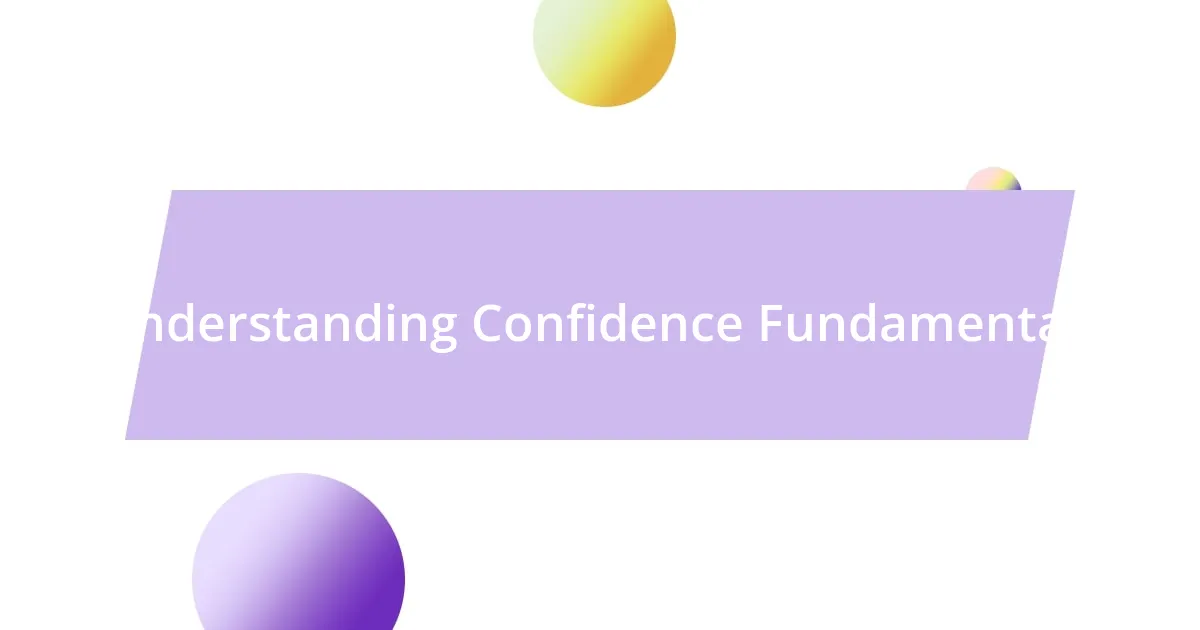
Understanding Confidence Fundamentals
Confidence isn’t just a trait; it’s a skill that can be developed over time. I remember a time when I hesitated to share my ideas in meetings, feeling my voice wasn’t strong enough. It struck me that this doubt stemmed from a lack of practice in expressing myself, which made me realize how important it is to cultivate confidence through experience.
One fundamental aspect of confidence is self-awareness. I once had an eye-opening experience when a friend pointed out my strengths during a challenging moment. It made me wonder: How often do we overlook our own achievements? Recognizing our unique abilities can serve as a foundation to build our confidence. Each time I acknowledge a personal victory, no matter how small, I feel that surge of assurance.
Furthermore, visualization can significantly boost confidence levels. I’ve found that picturing myself succeeding in various scenarios helps me approach challenges with a positive mindset. Have you ever imagined yourself walking into a situation with confidence? This simple mental exercise transforms anxiety into anticipation and primes me for real-world success.
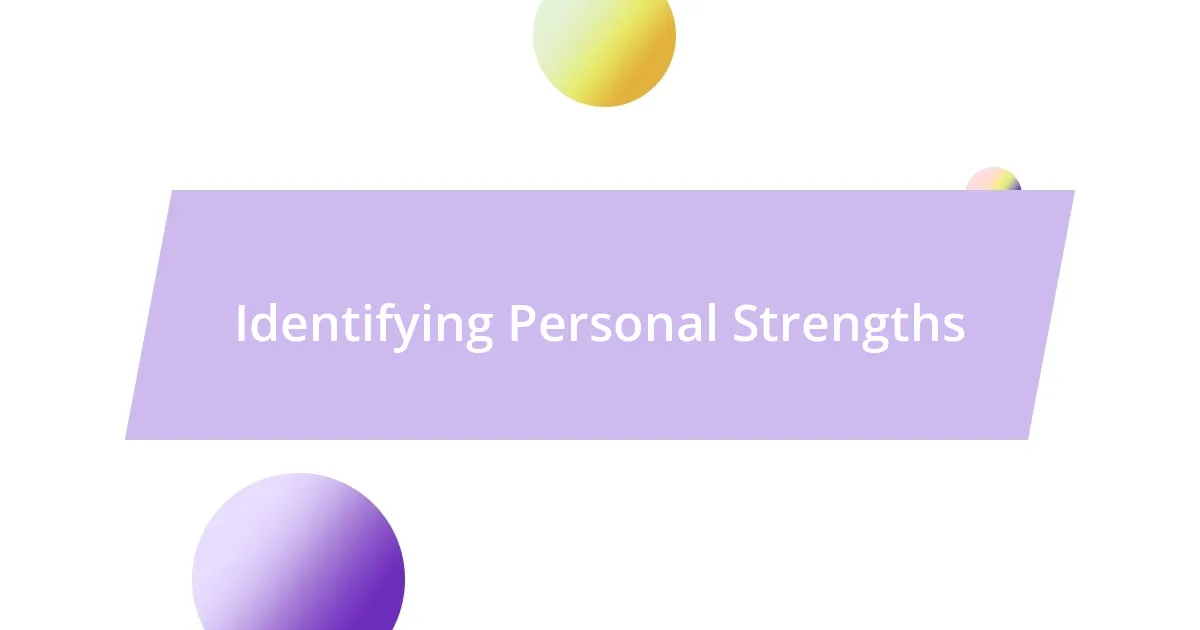
Identifying Personal Strengths
Identifying personal strengths is crucial to understanding what boosts our confidence. I recall a time during a group project when I took charge of organizing our ideas. To my surprise, my knack for bringing order to chaos shone through. That moment made me realize that my organizational skills were not just an asset but a vital part of my identity. Acknowledging that strength gave me the confidence to lead future projects.
To help pinpoint your own strengths, consider these strategies:
– Reflect on past achievements and identify patterns in what you excelled at.
– Ask friends or colleagues to share what they see as your standout qualities.
– Engage in self-assessment tools, like personality tests, to uncover hidden strengths.
– Keep a journal of daily wins, big or small, to track your capabilities over time.
– Observe activities where you feel energized; this often signals where your strengths lie.
Recognizing these strengths allows us to embrace our potential fully and harness the confidence necessary for impactful contributions.
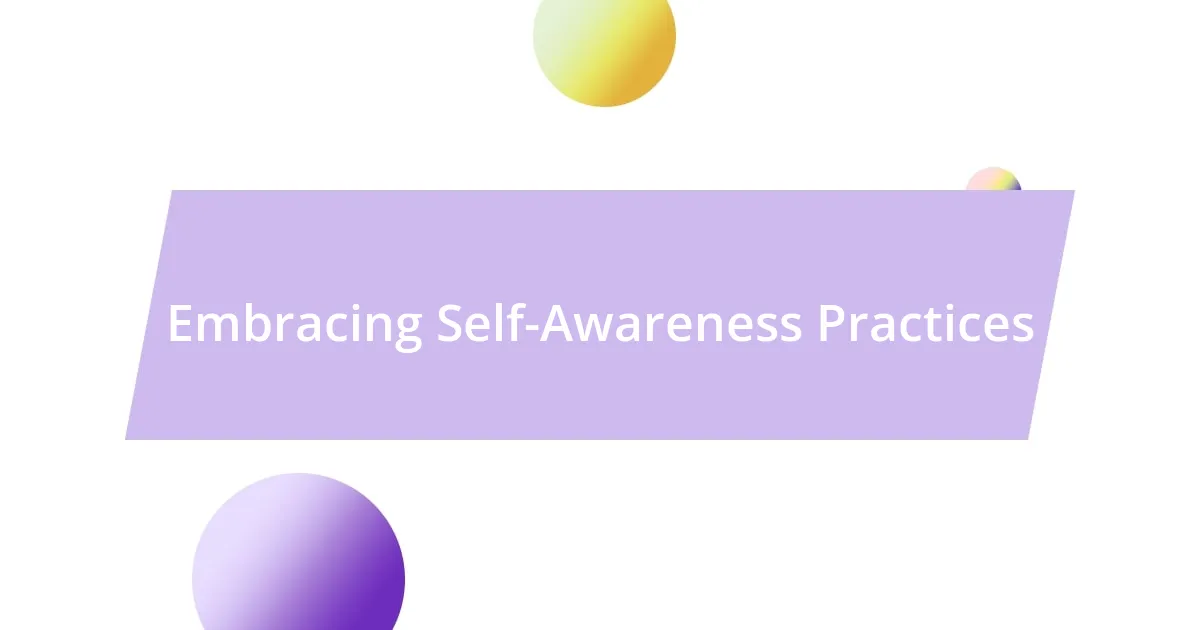
Embracing Self-Awareness Practices
Embracing self-awareness practices is a transformative journey. I remember when I started journaling, pouring out my thoughts each evening. This simple act of reflection opened my eyes to patterns in my emotions and behaviors, revealing how they influenced my confidence. It’s almost like holding up a mirror to your soul; once you see your true self, it becomes easier to step into your power with clarity.
Another valuable practice I’ve adopted is mindfulness meditation. I vividly recall the first time I sat in silence, focusing on my breath. My thoughts raced at first, but slowly, I learned to observe rather than react. This practice grounded me, making me aware of my inner dialogue. Have you ever noticed how critical we can be of ourselves? Recognizing this negative chatter helped me replace it with encouragement, pushing me to be more confident in my abilities.
Building on this, feedback can be a powerful tool for self-awareness. I used to shy away from criticism, fearing it would deflate my confidence. However, learning to view feedback as constructive rather than personal has been eye-opening. I remember a specific conversation where a mentor highlighted an area of improvement, and rather than feeling defeated, I embraced it. This shift in perspective enriched my self-awareness and ultimately strengthened my confidence.
| Self-Awareness Practices | Description |
|---|---|
| Journaling | A reflective practice that helps to identify emotions and behaviors, enhancing understanding of personal experiences. |
| Mindfulness Meditation | A technique that encourages present-moment awareness, fostering a deeper understanding of one’s inner voice and self-perception. |
| Feedback Reception | The process of receiving constructive criticism and feedback to enhance personal growth and self-awareness. |
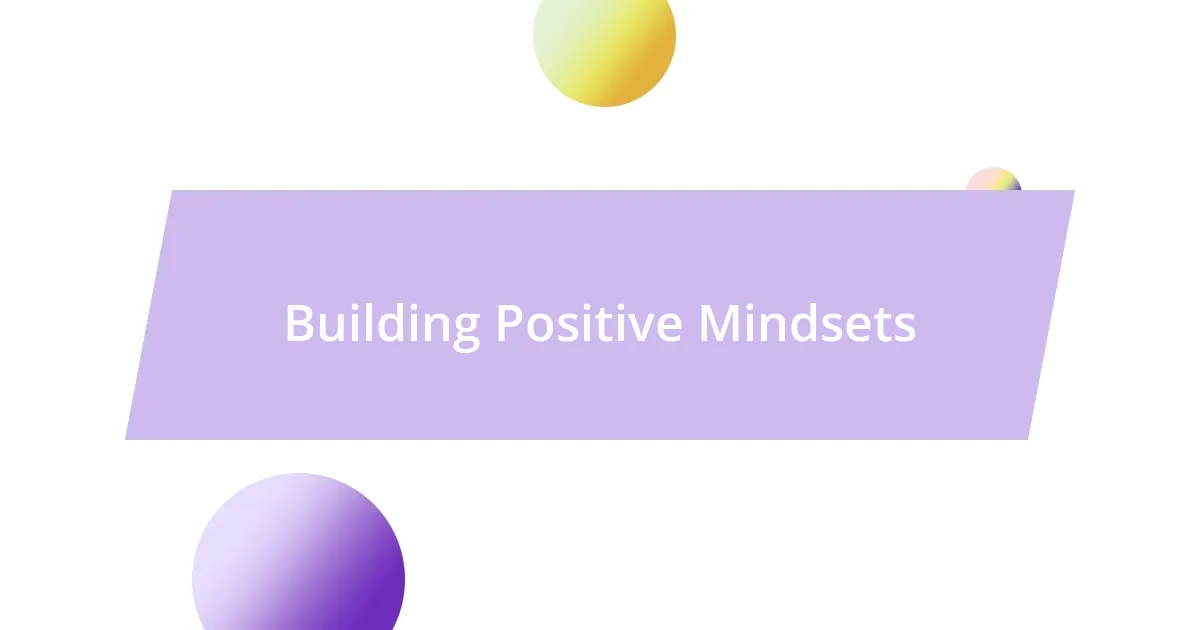
Building Positive Mindsets
Building a positive mindset often begins with the simple act of reframing negative thoughts. I’ll never forget a time when I faced a disappointing setback at work. My initial reaction was to dwell on the negativity, but then I paused and asked myself, “What can I learn from this?” Shifting my focus to the lessons rather than the loss completely transformed my perspective. It’s incredible how a slight change in thought can turn a stumbling block into a stepping stone.
Another approach I’ve embraced is surrounding myself with positivity—whether through uplifting books, inspiring podcasts, or supportive friends. I remember attending a workshop that focused on positive affirmations. Hearing everyone speak words of encouragement to themselves made me reflect on how often I overlooked my own strengths. Do you take the time to celebrate your accomplishments? When I started acknowledging my small wins, it led to a profound sense of gratitude. That awareness fortified my mindset and propelled my confidence forward.
Lastly, visualization has been a game-changer for me. I often practice picturing my goals as if they’ve already happened, which creates a sense of belief in my abilities. One evening, after a particularly challenging week, I visualized myself delivering a successful presentation. When the moment came, the confidence I cultivated through that visualization was palpable. Have you ever tried this technique? By painting a picture of success in my mind, I found not just confidence but the motivation to take action towards my goals. This practice truly encourages me to step boldly into whatever challenges lie ahead.
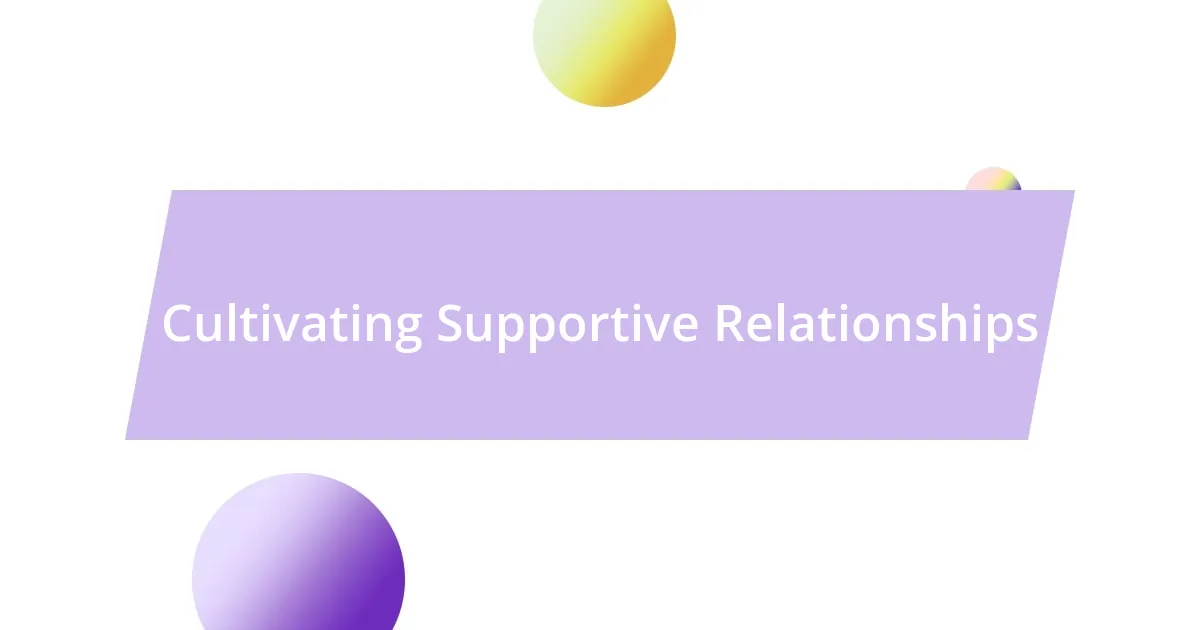
Cultivating Supportive Relationships
Cultivating supportive relationships has been a vital part of my journey toward confidence. I recall the time I reached out to a friend during a particularly challenging period at work. Just talking through my thoughts and feelings made me realize I wasn’t alone. Have you had a friend who really listened to you, making all the difference in how you felt? Those moments of connection remind me how powerful it is to lean on others for support.
Over the years, I’ve made a conscious effort to build a network of individuals who uplift me. At a network event, I met someone who shared my passion for growth. We quickly bonded and began to exchange insights about our professional journeys. I often think about how valuable it is to foster relationships like that. Whenever I share my goals with this person, their encouragement inspires me to take bolder steps toward my dreams.
There’s something transformative about surrounding yourself with positivity. I remember joining a local group that focused on personal development. The energy in the room was electric; each member’s enthusiasm fueled my own. It got me thinking—who in your life ignites your passion? This realization has made me intentional about engaging with those who not only support me but also challenge me to rise higher, strengthening my confidence in my impact along the way.
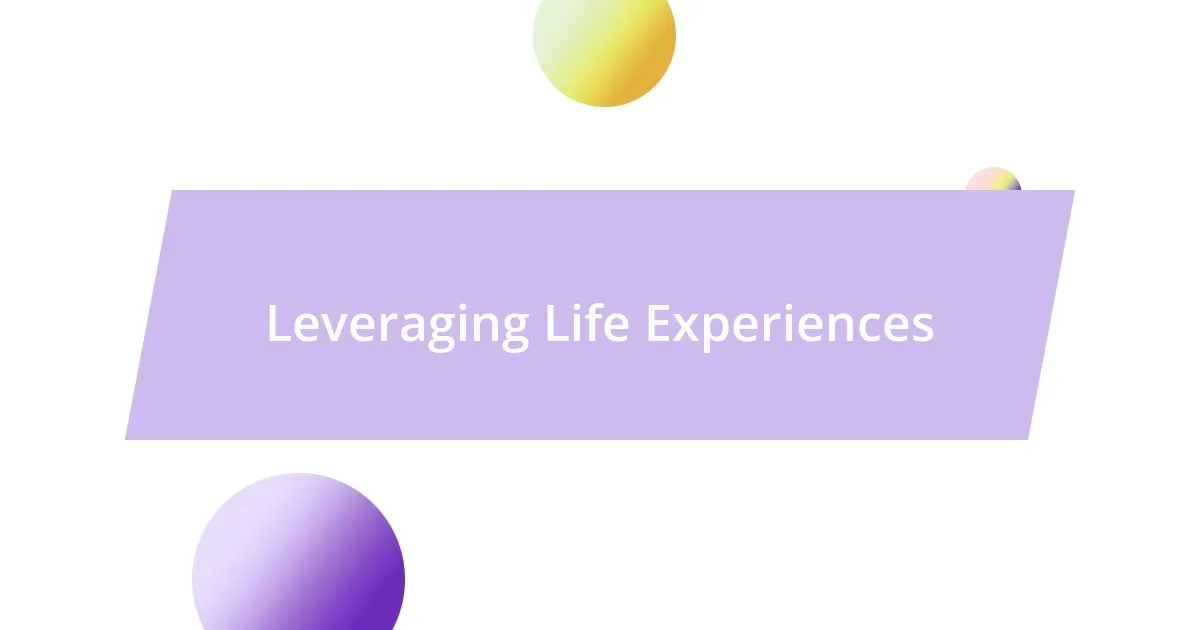
Leveraging Life Experiences
Leveraging life experiences has played a crucial role in shaping my confidence. I reflect on a time when I faced a significant personal challenge—moving to a new city alone. It felt overwhelming at first, but I decided to embrace it. Each day became an opportunity to meet new people and discover new places. Have you ever stepped out of your comfort zone and found strength in unexpected ways? Through that journey, I learned that my resilience was far greater than I had imagined.
In another instance, I had a mentor who helped me see my past struggles as assets rather than burdens. During one of our conversations, he encouraged me to recount my challenges. I realized that each difficult moment had equipped me with unique insights. This revelation changed my narrative from one of defeat to one of empowerment. It made me think—what stories from your life do you underappreciate? I find that by sharing these experiences, I not only build my confidence but also inspire others to see their journeys in a new light.
Moreover, there have been moments when reflecting on my life experiences has fostered a deep sense of gratitude. After a particularly tough week at work, I took a moment to jot down the lessons I’d learned from my mistakes. This simple act turned my frustration into appreciation. I believe that recognizing the value hidden in our experiences is essential. How often do we forget to acknowledge what we’ve overcome? Embracing this perspective has empowered me, reinforcing my belief that I can make a meaningful impact in both my life and the lives of others.
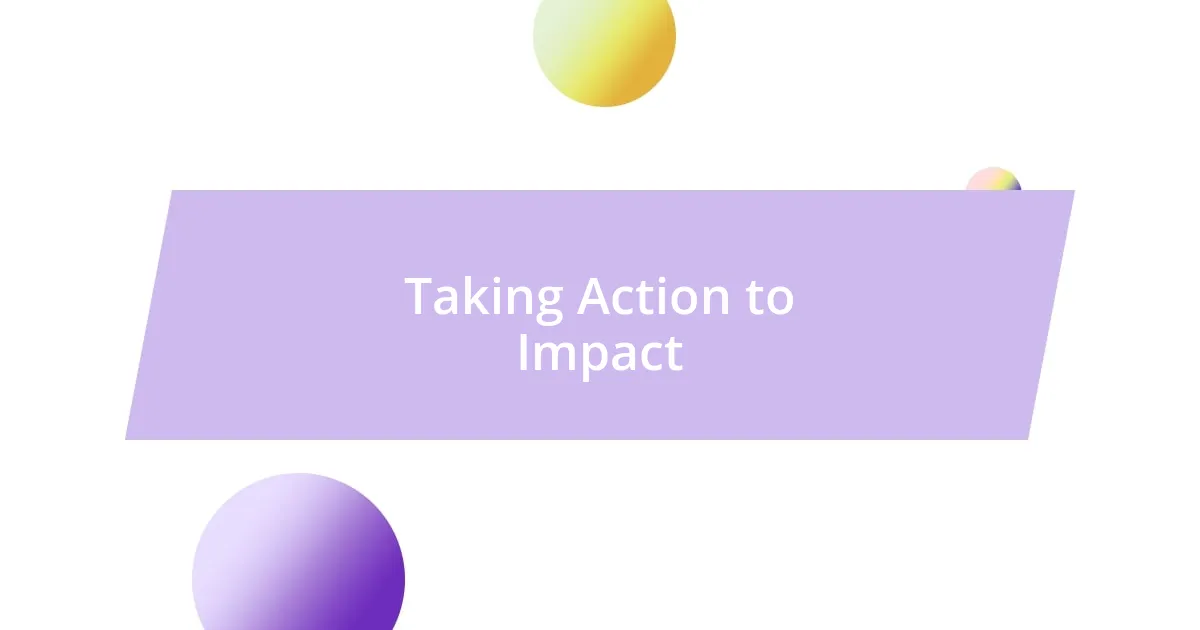
Taking Action to Impact
Taking action to create an impact requires courage and a willingness to step beyond my comfort zone. I remember a pivotal moment when I volunteered for a community project that aimed to support local families in need. Initially, I felt anxious about my ability to contribute meaningfully. Yet, as I began organizing events and rallying support, I discovered a newfound strength. Have you ever taken a leap that initially scared you, only to find it changed your perspective completely? It was that experience that pushed me to embrace action as a pathway to fostering positive change.
The beauty of action lies in its ability to inspire others. One afternoon, I decided to host a small workshop focused on sharing skills I had developed over the years. I was nervous about putting myself out there, but the participants’ enthusiasm recharged my spirit. Seeing their faces light up as they learned something new reminded me of the ripple effect each action can create. Isn’t it fascinating how a single step can ignite motivation in others? That experience not only boosted my confidence but also reinforced my belief in the power of collective action.
Sometimes, taking action entails facing resistance or doubt. I vividly recall submitting a proposal for a significant project that seemed far beyond my reach at the time. The fear of rejection loomed large, yet I decided to press forward. The moment I hit ‘send,’ I felt a mix of fear and excitement coursing through me. In that moment of vulnerability, I realized that taking action is often about embracing uncertainty. What’s holding you back from making your mark? I’ve learned that confidence strengthens with each bold step I take, even when the outcome isn’t guaranteed.

